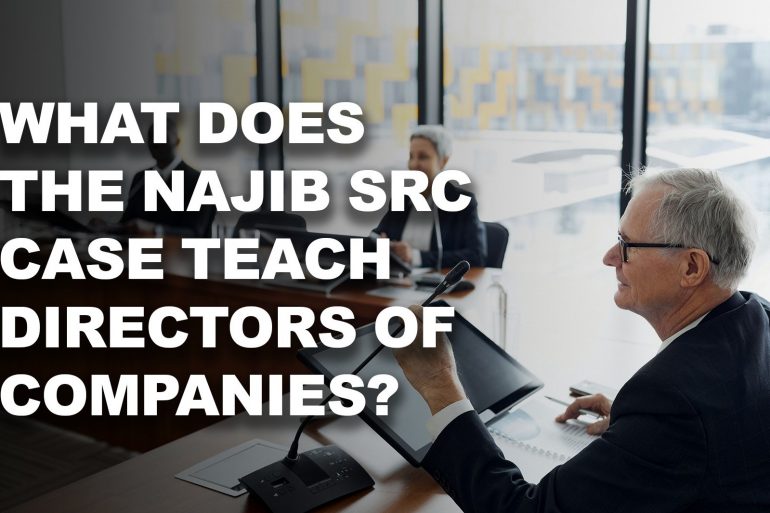WHAT DOES THE NAJIB SRC CASE TEACH DIRECTORS OF COMPANIES?
WHY IS THE SRC CASE IMPORTANT?
This decision affects two classes of people: controlling shareholders and the board of directors of a company (As well as that of a GLC or ‘government linked company’).
[1] NAJIB’S SRC CASE
Najib was charged under three different criminal laws:
- For using his ‘office or position’ for ‘gratification’ either for himself or for an associate.1Under s.23 of the Malaysian Anti Corruption Commission Act 2009 (or the ‘MACC Act’).
- For breaching the trust placed in him as a ‘public servant or agent’.2 Under section 409 of the Penal Code
- A charge under s.4 of the Anti Money Laundering, Anti terrorism Financing and Proceeds of Unlawful Activities Act 2001 (AMLA Act).
[2] SOME HISTORY
A controlling shareholder of a company or board director have always had ‘fiduciary duties’.
‘Fiduciary’ means ‘trustee’. A trustee must always act in the best interest of his beneficiary. Directors are ’trustees’ to both the company and its shareholders.
If a fiduciary broke his duties, he could be sued in two different ways. First, through a civil suit, a company could seek damages, and also an order to remove the recalcitrant as a director.
Yet the Najib case does not add any new extra dimension to the old law.
[3] THE LAW IN THIS AREA WAS ESTABLISHED OVER 120 YEARS AGO
It all started with the case of Percival v Wright [1902] 2CH 401.
It concerned a company called Nixon’s Navigation Co. Its shareholders wished to sell their shares. They asked the company secretary to find buyers.
Some directors of the company purchased the shares at £12 and £10, respectively. That price had been based on independent valuation.
After the sale, some shareholders discovered that members of the Board of Directors had been involved in negotiations to sell the entire company’s shares.
Had the directors been successful, the value of the shares would have risen. But the director had failed.
The shareholders sued the directors. They alleged that board members had breached their fiduciary duties. The question was: did these directors owe any duty to the other shareholders? The court said, ‘No’: it ruled that there was ‘no question on unfair dealing in this case’.
In 2001, Peskin v Anderson [2001] BCLC 372 described the ruling in Percival v Wright merely as a ‘general rule’. Peskin itself would decide that sometimes a director may owe a greater duty to an individual shareholder, such a shareholder was ‘vulnerable’.
[4] A DIRECTOR WHO BOUGHT CINEMA THEATRES
The leading case in this area is Regal (Hastings) Ltd v. Gulliver [1942] UKHL 1.
Regal owned a cinema. It negotiated for the purchase of two more cinemas in Hastings, UK.
Regal had five directors, including Gulliver, its chairman. Regal incorporated a subsidiary called Hastings Amalgamated Cinemas Ltd (‘Amalgamated’). Amalgamated had a share capital of 5,000. There were six directors on its board. Five were directors of Regal.
Regal could only subscribe for shares worth 2,000. Directors of Amalgamated agreed to subscribe for only 500 shares each; but Gulliver agreed to ‘find investors’, and he did so.
As a result, 200 Amalgamated shares were allotted to a Swiss company (‘Seguliva’); 200 to another company called South Downs Land Co Ltd and 100 to one Miss Geering, Gulliver’s friend.
Now Gulliver had his hands everywhere. Gulliver was Regal’s chairman. He held minority shares in Seguliva and South Downs. He was a director of Seguliva and the managing director of South Downs. He signed Amalgamated’s share subscription cheques on their behalf.
The shares in Amalgamated were afterward sold: at a profit.
Did Amalgamated’s directors need to pay their profit to the company? The House of Lords said ‘Yes’. It ruled that directors could not take ‘any personal advantage’ of the ‘information within the company’ or to ‘violate’ their ‘duty of loyalty to the company’.
Even if a director is neither fraudulent nor dishonest, that does not mean he can escape liability. If he breaches his fiduciary duties, or had acted in the best interest of the company, he is done for.
So, the duty of loyalty to the company is high.
Regal (Hastings) thus drew a clear separating line between the main shareholder-director and the company he owns, from his loyalty to the company.
[5] CAN A DIRECTOR ESCAPE THESE STRICT RULES?
Sometimes, he can.
Such breaches could be sidestepped, if the shareholders later approve them later, by a ‘shareholder ratification’.
[6] THE CRIMINAL SANCTION
A director can be prosecuted for breaching his trust duties. Sentences include imprisonment and very high fines.
The Najib case demonstrates the consequences of a trustee breaching his duties.
[7] THE TAKEAWAY
If A Co controls B Co and spends B Co‘s money, and if the Decision Makers are in conflict of interest, then they are liable in both civil and criminal law.
Second, the Decision Makers need not have ‘personally’ benefited. It is enough if someone connected to the Decision Maker benefits.
The SRC case discusses what a shadow director is, what are his duties, and when he can be made liable in criminal law. You need not know very much, save that the duties of a normal director are no different from that of a shadow director. The reason the latter is called a ‘shadow director’ is because he lurks in the shadows. With invisible hands, he controls what a company’s Board does: and determines what the company eventually does – or omits to do.
So, if a person outside the board ‘controls’ the company – either through the board or through other means – then any shadow director is as much liable as any other director who breaches his duties in law. That is what the Najib case teaches us.
So, if you are a decision maker in a company, whether you are a director, a shadow director, or a majority shareholder, you need to act with great care.





